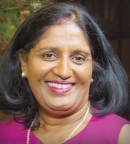
Kala Visvanathan, MD, MHS
Kala Visvanathan, MD, MHS, is working to prevent cancer in every patient. With the help of donor-supported grants, including a Career Development Award from Conquer Cancer®, the ASCO Foundation, Dr. Visvanathan researches cancer prevention and strategies to prevent cancer recurrence.
“To be successful in preventing cancer,” said Dr. Visvanathan, Professor of Epidemiology and Oncology at Johns Hopkins Bloomberg School of Public Health in Baltimore, “we need to understand what is happening in the real world.”
Dr. Visvanathan specializes in breast and ovarian cancer, and explores why, for example, there are some patients who have not had germline testing to determine if they are a carrier of the BRCA1/BRCA2 genetic mutation, even though they fit the criteria for testing. The test, which has been available for more than a decade, indicates the likelihood for developing ovarian, breast, and other types of cancer. Still, not all patients are aware the test exists, have access to the testing, or feel comfortable taking advantage of it.
“We found the disparity to be worse among individuals of low socioeconomic status, even if they have insurance,” explained Dr. Visvanathan. “This group of individuals and their families could benefit enormously from [cancer] prevention given the rising costs of treatment.”
The Future of Cancer Prevention
“To reduce the risk of cancer in women and men, we must remove any barriers so that patients and providers not only have access to the best care, but also understand the benefits of prevention,” she said.
Data are driving Dr. Visvanathan to solutions to serve her diverse patient population. She and her team continue to explore new avenues in research and look to the next generation of scientists to help uncover new information.
“I believe strongly that technologic advances enabling us to merge large databases from multiple sources that have information on all types of individuals can be used to better understand the source of disparities and then identify effective solutions to address them,” concluded Dr. Visvanathan.
© 2020. American Society of Clinical Oncology. All rights reserved.

